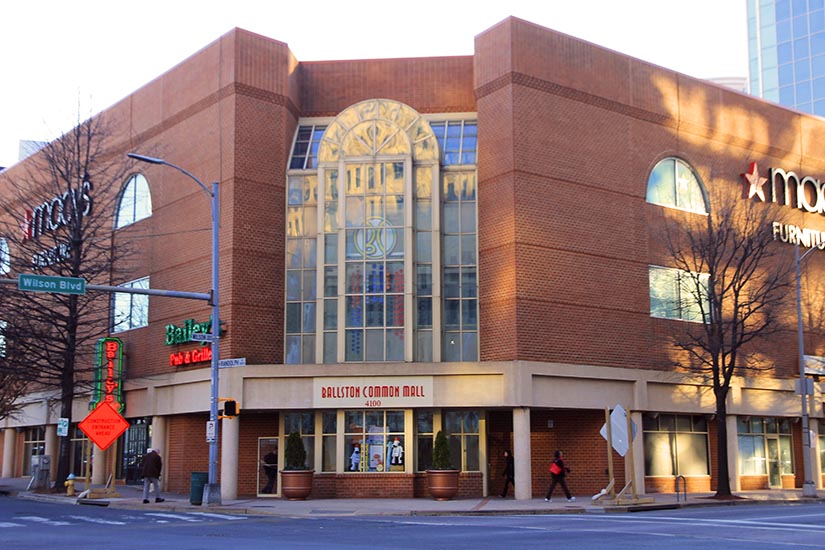Physical Address
304 North Cardinal St.
Dorchester Center, MA 02124
Physical Address
304 North Cardinal St.
Dorchester Center, MA 02124

Forest City Enterprises recently received approval from Arlington County to redevelop its Ballston Common Mall. The deal is a public-private partnership in which the county will pay for $10 million in infrastructure improvements around the mall and provide $45 million in tax increment financing for the reconstruction. The deal is not only a waste of taxpayer money, but it also perpetuates development through political favoritism as opposed to allowing competition to determine the best use of land.
Opened in 1986, today Ballston Common Mall is a sad structure with a high vacancy rate. However, a public-private partnership isn’t needed to turn it into an updated, profitable development. The mall sits on incredibly valuable land. A nearby parcel less than half the size of the mall site recently sold for $7.5 million. With demand so high for land along Arlington’s Rosslyn-Ballston Corridor, county money certainly isn’t needed to facilitate retail development.
The mall owner, Forest City Enterprises, is well-versed in navigating public-private partnerships. In DC the company has received over $100 million in subsidies for recent projects. Forrest City Ratner, the corporation’s New York office, was the developer of the famed Atlantic Yards (now Pacific Park) project that has become a poster project for cronyism in real estate. Like the Atlantic Yards project, the Ballston Common Mall redevelopment will involve both direct subsidies and a TIF. The TIF that will help finance the new mall is debt financing that will be paid back with property tax increases that county officials believe the new mall will bring. This will be the first TIF ever used in Arlington. The Ballston project follows a high-profile retail development in Fairfax County, where the Mosaic District was completed as that county’s first TIF. By allowing municipal policymakers to spend future tax revenues today, TIFs provide a tool for obscuring the costs of economic development projects.
As a national development company with political connections, Forest City Enterprises is in a position to navigate Arlington’s development approval processes and to negotiate subsidies. But this isn’t so for smaller developers. Large-scale, government-supported development is only open to politically-connected firms, and policymakers face strong incentives to negotiate with these firms in exchange for campaign contributions and other benefits. However, these deals are paid for by taxpayers. In addition to resulting in profligate spending, this process also results in banal development by limiting competition to those very large firms that are accustomed to negotiating on the public square rather than the market square.
The redevelopment of the Ballston Common Mall will benefit the neighborhood, but this redevelopment is inevitable; it doesn’t need to be pushed along by county money. With an average household income over $120,000 and a very high population density, the area can certainly support retail without subsidies. Retailers face every incentive to provide a pleasant environment for shoppers and potential shoppers without government support, and all sorts of retail developments provide high quality public space voluntarily. For example, the Georgetown Business Improvement District provides outdoor space, landscaping, and seating to make the area pleasant for shoppers and window shoppers alike. Reading Terminal Market is a tourist destination in addition to a retail destination because of the interesting public space that it offers. Traditional shopping malls provide a place for people watching in a climate controlled environment, even for those who go without the intention of buying anything.
Subsidizing the Ballston mall redevelopment is a handout to the owner of a highly desirable piece of land. The deal allows the developer to go forward using other people’s money, and it provides county officials with the chance to grant favors and to be more involved in the planning process that they otherwise would be. This deal has clear benefits to those involved in the negotiations, but it will be done at the expense of Arlington residents, who likely don’t even know that they’re being required to pay for the construction of their new mall.
These schemes are a fraud. There may indeed be tax increments at, in this case, the Ballston Common Mall. However there are offsetting tax decrements at competing facilities as business shifts to the TIF financed facility. So while the increased revenue out of the Ballston Common Mall may indeed support the TIF bonds the new business here is at the expense of business elsewhere, which as a consequence pays less tax. As tax revenues are increasingly dedicated to servicing TIF debt when rivals to the BCM demand Me-too financing the tax revenue available to support general government obligations diminishes. And to maintain solvency governments have to ratchet up tax rates. It’s a clever way for crony capitalists and their governmental enablers to rip off the public.